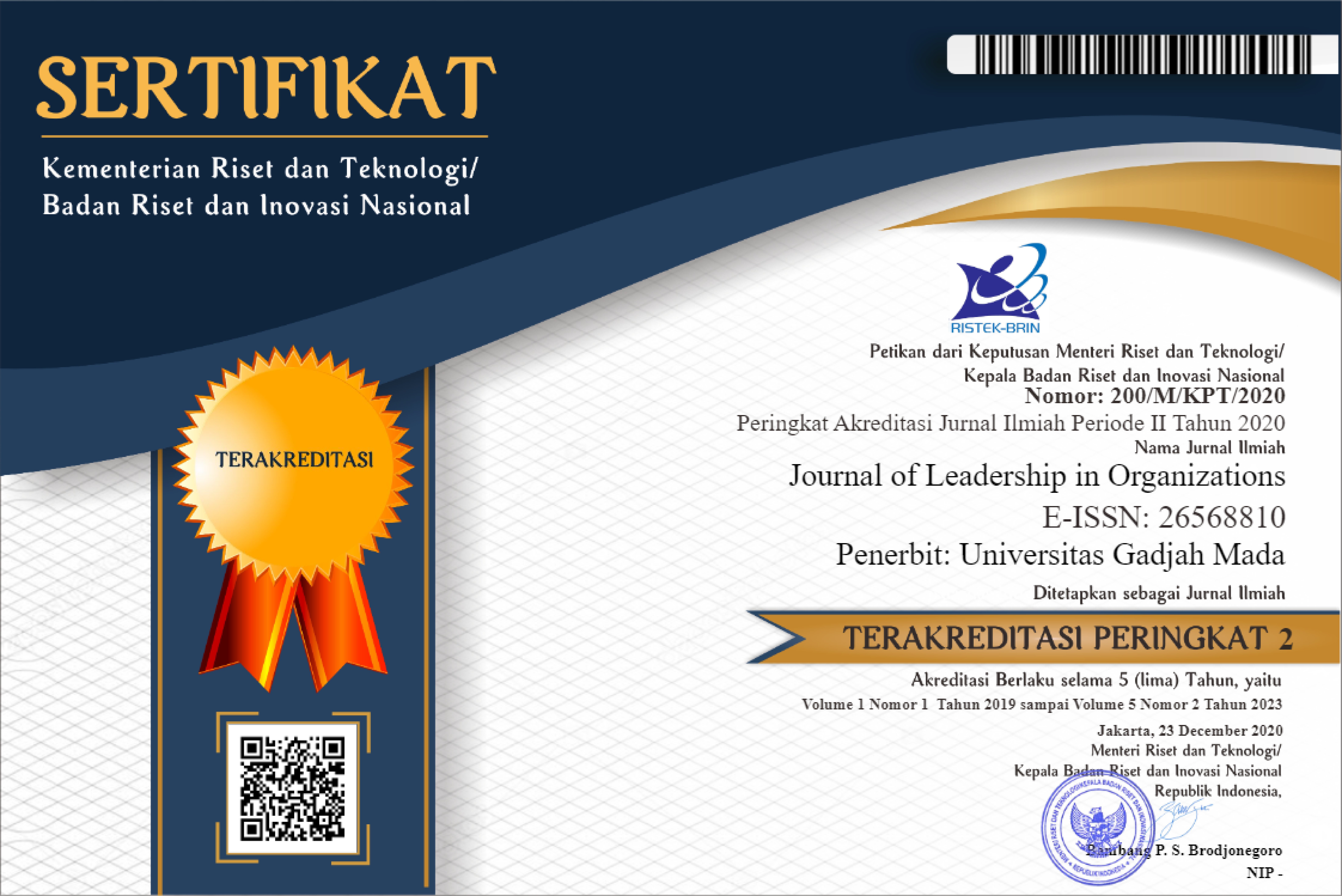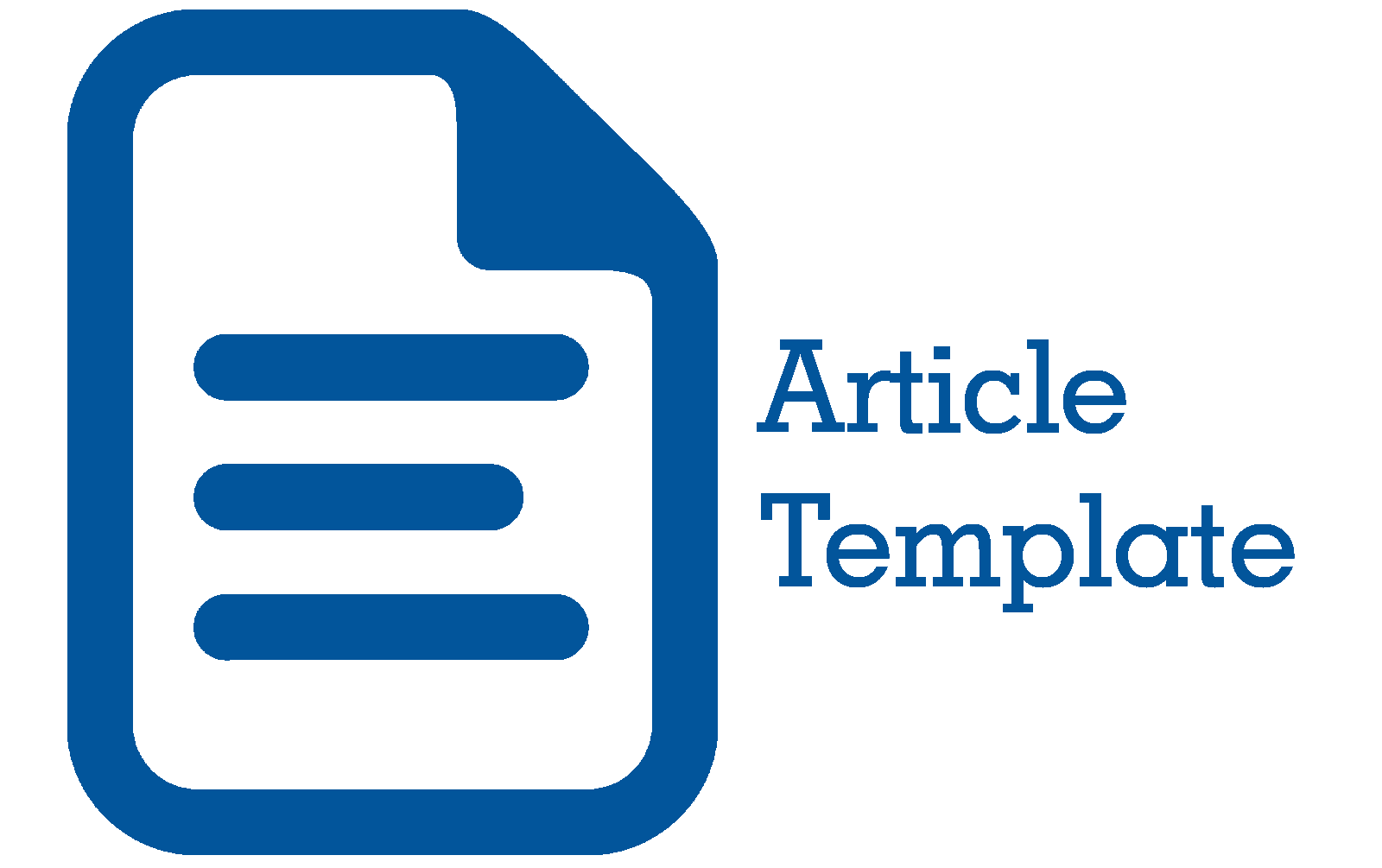SELF-LEADERSHIP AND CAREER SUCCESS: MOTIVATION OF COLLEGE LECTURERS
Sari Laelatul Qodriah(1), Wiwi Hartati(2), Abdul Karim(3*)
(1) Muhammadiyah University of Cirebon
(2) Muhammadiyah University of Cirebon
(3) Universitas Muhammadiyah Cirebon
(*) Corresponding Author
Abstract
Keywords
Full Text:
Download PDFReferences
Abawi, K. (2013) ‘Data Collection Instruments (Questionnaire & Interview)’, Training in Sexual and Reproductive Health Research Geneva, 1(Geneva Workshop 2013), p. 18. Available at: http://www.gfmer.ch/SRH-Course-2012/Geneva-Workshop/pdf/Data-collection-instruments-Abawi-2013.pdf.
Abele, A. E. and Spurk, D. (2007) ‘Self-regulation and Career Success. Findings from a Three-year and Three-wave Longitudinal Study’, Labor and Socio-Economic Research Center, 6(6), pp. 1–39.
Abele, A. E. and Spurk, D. (2009) ‘How do objective and subjective career success interrelate over time ?’, Journal of Occupational and Organizational Psychology, 82, pp. 803–824. doi: 10.1348/096317909X470924.
Alzyoud, A. A. Y. (2017) ‘The Predictors of Career Success’, International Review of Management and Marketing, 7(2), pp. 22–26. Available at: http: www.econjournals.com.
Ariani, D. W. (2013) ‘Personality and Learning Motivation’, European Journal of Business and Management, 5(10), pp. 2222–2839.
Ballout, H. I. (2007) ‘Career success support’, Journal of Managerial Psychology, 22(8), pp. 741–765. doi: 10.1108/02683940710837705.
Bencsik, A., Machova, R. and Hevesi, E. (2012) ‘The relationship between motivation and personality type.pdf’, International Journal of Academic Research, pp. 83–88.
Boudreau, J. W., Boswell, W. R. and Judge, T. A. (1999) ‘Effects of Personality on Executive Career Success in the U.S. and Europe’, Journal of Vocational Behaviour. (CAHRS Wor. NY: Cornell University,: Cornell University, School of Industrial and Labor Relations, Center for Advanced Human Resource Studies., 58, pp. 53–81. Available at: htp://digitalcommons.ilr.cornell.edu/cahrswp/111.
Browning, Michelle. (2018). Self-Leadership: Why It Matters. International Journal of Business and Social Science Volume 9, Number 2, p.p. 14-18.
Cents, M. H. G. (2013) Effect of Values and Personality on the Motivation and Intention of User-Generated Content Across Cultures. Universiteit Twente.
Chen, X. (2016) ‘The Influences of Personality and Motivation on the Sharing of Misinformation on Social Media’, in iConference, pp. 1–11. doi: 10.9776/16145.
Colburn, A. (2008) ‘Correlation and causality’, Science Teacher, 75(2), p. 10. doi: 10.1177/014662168100500215.
Daniel, M. (2004) Doing quantitative research in education with SPSS, Evaluation & Research in Education. London, England: SAGE Publication Ltd. doi: 10.1080/09500790.2011.596379.
Dweck, C. S. and Leggett, E. L. (1988) ‘A Social-Cognitive Approach to Motivation and Personality’, Psychological Review, 95(2), pp. 256–273.
Faqeer-ul-ummi, U. Y., Javed, R. and Amjad, M. (2014) ‘Impact of personality on career success’, International Journal of Innovation and Applied Studies, 9(3), pp. 1064–1072. Available at: http://www.ijias.issr-journals.org/.
Gibson, I. and Donelly (1996) Organisasi, Perilaku, Struktur, Proses. Edited by N. Ardiani. Jakarta, Indonesia: Penerbit Binarupa Aksara.
Houghton, J. D., & Neck, C. P. (2002). The revised self-leadership questionnaire: Testing a hierarchical factor structure for self-leadership. Journal of Managerial Psychology, 17(8), 672-691.
Ivancevich, J. and Matteson, M. (2002) Organisational Behaviour and Management. New York, USA: McGraw-Hill Irwin.
Judge, T. A. and Ilies, R. (2002) ‘Relationship of personality to performance motivation: A meta-analytic review’, Journal of Applied Psychology, 87(4), pp. 797–807. doi: 10.1037/0021-9010.87.4.797.
Judge, T. A. and Kammeyer-Mueller, J. D. (2007) ‘Personality and Career Success’, Main Currents in the Study of Career: Careers and the Indifidual, 4(7), pp. 59–78.
Lawrence, C. (2010) ‘Causal Theory and Research Design Chapter 6 of The Craft of Political Research’, pp. 1–56.
Kyguoliene, A. & Ganusauskaite, A. (2017). Dimensions Of Youth Self-Leadership: Measuring Skills, Behaviours And Cognitions. Proceedings of the 2017 International Conference “Economic Science for rural development” No 46
Jelgava, LLU ESAF, 27-28 April 2017, pp. 84-91.
Luthans, F. (2006) Perilaku Organisasi. Edisi 10. Yogyakarta, Indonesia: Penerbit Andi.
MacLean, S. and Gray., K. (1998) ‘Structural equation modelling in market research’. . Journal of the Australian Market Research Society.
Manz, C. C., & Sims, H. P. (1991). Super-leadership: Beyond the myth of heroic leadership. Organizational Dynamics, 19(4), 18-35.
March, C. and Smyth I., M. M. (1999) A Guide to Gender-Analysis Frameworks. Oxfam.
Maslow, A. H. (1955) Motivation and Personality. Third Edit, Motivation and personality. Third Edit. Edited by L. Carr. New York, USA: Longman, Inc. doi: 10.1037/h0039764.
Maslow, A. H. (1970) A Theory of Human Motivation. the Englis, Motivation and personality. the Englis. Harper & Row, Publishers, Inc. doi: 10.1098/rstb.2010.0126.
Mathis, R. L. and Jackson, J. H. (2005) Human Resource Management: Essential Perspective. Mason, Ohio: Thomson-South-Western.
Mintzberg, H. (1981) Organiation Design: Fashion or Fit? Harvard Business Review.
Neck, C. P., Houghton, J. D. (2006). Two Decades of Self-Leadership Theory and Research: Past Developments, Present Trends, and Future Possibilities. Journal of Managerial Psychology, Volume 21, Issue 4, pp. 270–295.
Oberhuber, S. and Maurer, I. (2015) ‘Quantitative Data Analysis’. Text durch Klicken hinzufügen, pp. 1–26.
Parks, L. and Guay, R. P. (2009) ‘Personality, values, and motivation’, Personality and Individual Differences, 47(7), pp. 675–684. doi: 10.1016/j.paid.2009.06.002.
Paterson, A. et al. (2016) Quantitative Data Gathering Methods and Techniques. The Global, Research Methods for Accounting and Finance. The Global. Oxford England: Goodfellow Publishers Ltd. doi: 10.23912/978-1-910158-88-3-3226.
Perumal, T. (2014) ‘Quantitative Research Methods’, Course Material, Chapter 8(Leedy 1993), pp. 87–104. doi: http://dx.doi.org/10.5210/fm.v8i1.1023.
Qodriah, S. L. and Hartati, W. (2014) ‘Kesukesan Karir Dosen melalui Kepribadian dan Motivasi (studi pada Perguruan Tinggi di Wilayah Cirebon)’, Jurnal Manajeen, Akuntansi dan Ekonomi Pembangunan, 12(2).
Reichel, A. et al. (2006) ‘Organising career success . An ex- ploratory study of individuals ’ con- figuration of objective and subjective career success .’, in The Organizing Society Sub-theme 18: Careers as Forms of Organizing, pp. 1–23.
Robbins, S. P. (2006) Perilaku Organisasi. Jakarat, Indonesia: PT. Indeks Kelompok Gramedia.
Schneider, D. K. (2005) ‘Quantitative Data Analysis’, Research Design for Educational Technologists, 1(5), pp. 1–24.
Seibert, S. E., Crant, J. M. and Kraimer, M. L. (2014) ‘Proactive Personality and Career Success’, Journal of Applied Psychology, 84(3), pp. 416–427. doi: 10.1037/0021-9010.84.3.416.
Sesen, H., Tabak, A., & Arli, O. (2017). Consequences of self-leadership: A study on primary school teachers. Educational Sciences: Theory & Practice, 17, 945–968. http://dx.doi.org/10.12738/estp.2017.3.0520.
Sugiono (2006) Metode Penelitian Bisnis, Cetakan ketujuh. Bandung, Indonesia: Penerbit CV. Alvabeta.
Tacq, J. (2011) ‘Causality in qualitative and quantitative research’, Quality and Quantity, 45(2), pp. 263–291. doi: 10.1007/s11135-009-9293-0.
Tat, U. & Zeitel-Bank, N. (2013). Self Leadership Development: The Link Between Body, Mind, And Reflection. International conference 2013 Zadar. Croatia: Management, Knowledge and Learning.
Trusler, Ingrid. (2018) The relationship between self-leadership and shared leadership on team performance. Pretoria: The Gordon institute of Business Science, University of Pretoria.
Turban, D. B., Moake, T. R. and Wu, S. Y. (2017) ‘Linking Extroversion and Proactive Personality to Career Success : The Role of Mentoring Received and Knowledge’, Journal of Career Development, 44(1), pp. 20–33. doi: 10.1177/0894845316633788.
Wood, C. (2004) Organizational Behavior. 3rd Editio. Australia: Jhon Wily & Son Australia Ltd.
Article Metrics
Refbacks
- There are currently no refbacks.
Copyright (c) 2019 Journal of Leadership in Organizations

This work is licensed under a Creative Commons Attribution-ShareAlike 4.0 International License.
| Journal of Leadership in Organizations |
| Journal of Leadership in Organizations (JLO), with registered number ISSN 2656-8829 (Print) and ISSN 2656-8810 (Online), is published by the Center for Leadership Studies, Department of Management, Faculty of Economics and Business, Universitas Gadjah Mada. The content of this website is licensed under a Creative Commons Attribution-ShareAlike 4.0 International License |
| © 2019 Journal of Leadership in Organizations | |





_logo2.png)


.png)




